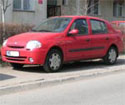Asociatia pentru combustibili sintetici din Europa, Alliance for Synthetic Fuels in Europe

|
   |
Asociatia pentru combustibili sintetici din Europa, Alliance for Synthetic Fuels in Europe
| cmandrei |
 13 Mar 2006, 11:33 13 Mar 2006, 11:33
Post
#1
|
||
 NEWSMAN Group: Moderatori Posts: 10.439 Joined: 9 March 05 From: Bucuresti/Targu Mures |
|
||
|
--------------------
ex. Renault
Clio Symbol
2001 Dynamique (1.4 8V 75 cp K7J-A7)
- RO 33.722 km - 12.2004
178.691 km - 03.2013 Andrei |
|||
| cmandrei |
 11 Oct 2006, 15:32 11 Oct 2006, 15:32
Post
#2
|
 NEWSMAN Group: Moderatori Posts: 10.439 Joined: 9 March 05 From: Bucuresti/Targu Mures |
Car makers and fuel suppliers support synthetic fuels driving towards sustainable mobility in Europe
Paris, 11 October 2006 The Alliance for Synthetic Fuels in Europe (ASFE) presented today in Paris their common vision for a cleaner road transport future. The Paris Mondial de l'Automobile hosted the Conference “Driving towards Sustainable Mobility” organised by ASFE. In his key-note speech, Mr Philippe Guillard, deputy-director of the energy directorate at the French Ministry of Industry, underlined the importance of security and diversification of energy supplies and environmental aspects in the French energy policy and welcomed the creation of ASFE. Launched in March 2006 in Brussels, ASFE is a unique initiative at the European level bringing together car manufacturers and fuel suppliers working towards reducing the environmental impact of road transport through improved energy efficiency and cleaner fuels. The founding members of ASFE: DaimlerChrysler, Renault, Royal Dutch Shell, Sasol Chevron and Volkswagen AG believe that synthetic fuels can deliver a cleaner fuel future, while at the same time meeting concerns about security and diversity of supply. Speakers from both the automotive and energy companies highlighted how synthetic fuels can deliver real emissions reductions today and even more as the technology develops. Furthermore, synthetic fuels made from natural gas and biomass can reduce petroleum dependency, providing a cost effective, realistic development path between today’s fuels and longer term renewable energy. Speaking on behalf of ASFE, Luc-Alexandre Menard, senior vice president public affairs, Renault: “As the EU moves towards building a more coherent energy policy for Europe, we are calling upon decision-makers to put forward measures to encourage R&D and support the market penetration of synthetic fuels for road transport in Europe. The role that these fuels can play in diversifying the energy supply, reducing emissions and improving the efficiency of road transport is 100% in line with the EU’s political goals.” Against this background, the objectives of ASFE are to promote synthetic fuels and support a range of activities in the field of sustainable mobility including research, projects demonstrating the benefits of synthetic fuels such as vehicle trials, cooperation with governments and promotion of public awareness. ASFE members are committed to synthetic fuels making a real contribution in many of Europe’s policy areas - combating climate change, reducing energy consumption, diversifying energy supplies, ensuring security of energy supply and improving air quality. The conference heard how, working together, the car manufacturers and fuel suppliers are making a new generation of engines, with further improvements in energy efficiency and reduced exhaust emissions using synthetic fuels. About synthetic fuels Synthetic fuels are a new generation of near zero sulphur and aromatics transport fuels made with the Fischer Tropsch process from natural gas (GTL), coal (CTL) or biomass (BTL). Of the three processes, GTL is the most commercially advanced and offers a practical alternative fuel today. A number of plants are being built or planned and product availability will increase from 2006 onwards. BTL needs further R&D investment but has the potential to use domestic resources in Europe. Greenhouse gas emissions associated with synthetic fuels derived from natural gas are comparable with transport fuels made from crude oil, while those produced from biomass can contribute to greenhouse gas reduction of up to 90%. As synthetic fuels can be used neat or blended in existing diesel engines, distribution and refueling infrastructure, they are the most cost effective solution to reducing petroleum dependency. Synthetic fuels can provide significant local air quality improvement by reducing tailpipe emissions (particulate matter, nitrogen oxides, carbon monoxide and hydrocarbons). About ASFE The Alliance for Synthetic Fuels in Europe (ASFE) was created in March 2006 in Brussels to address the strategic role of synthetic fuels in tackling today’s energy and environmental challenges. ASFE member companies share the commitment to work together towards reducing the environmental impact of road transport through improved energy efficiency and the use of cleaner fuels. sursa: renault.com ASFE |
|
--------------------
ex. Renault
Clio Symbol
2001 Dynamique (1.4 8V 75 cp K7J-A7)
- RO 33.722 km - 12.2004
178.691 km - 03.2013 Andrei |
|
| rttt_gia |
 11 Oct 2006, 15:48 11 Oct 2006, 15:48
Post
#3
|
 ExRenoAR Group: Members Posts: 488 Joined: 21 February 05 From: Bucuresti |
Ce o insemna sulf aproape 0? 6-7? sau 2-3?
|
|
--------------------
Kia
Cee'd
1.6 L
|
|

  |
| Random Picture | Google search | Last addition |
|---|---|---|
 |

căutare personalizată
|
 |
| Lo-Fi Version Harta site Parteneri Jocuri online Curs Valutar HRH Haine din lana merinos | Time is now: 7th July 2025 - 19:51 |